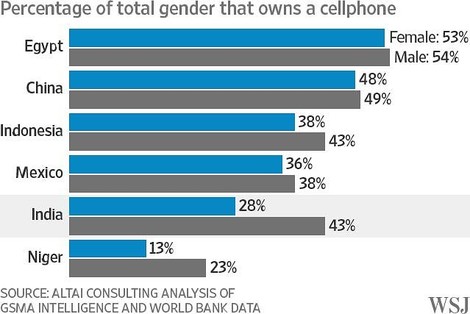Your podcast discovery platform
Curious minds select the most fascinating podcasts from around the world. Discover hand-piqd audio recommendations on your favorite topics.

piqer for: Global finds Technology and society
Prague-based media development worker from Poland with a journalistic background. Previously worked on digital issues in Brussels. Piqs about digital issues, digital rights, data protection, new trends in journalism and anything else that grabs my attention.
Digital Gender Gap: Why So Few Women Own A Smartphone In India
At the beginning of 2016, several villages in western India barred unmarried women and girls under the age of 18 from owning mobile phones, claiming they have a detrimental effect on their education. Elders who imposed the ban did not seem to think that mobiles were equally bad for the local young men, who continued using the devices without any interruption.
The situation in the western state of Gujarat is just an example, but it hits the nail on the head. There is a clear gender disparity in smartphone ownership in India. In fact, according to GSMA, a trade body of mobile operators, women in India are 36% less likely to own a mobile phone than men.
In its article, the Wall Street Journal tries to answer why the vast majority of women in India will never own a smartphone. Social conservatism and cultural restrictions seem to be the major forces at play. It is usually fathers or other males holding a position of power or authority who forbid the women from using smartphones for fear that the devices could lead to an illicit relationship or “at the very least give women a reputation for moral laxity”.
“Mobile phones are really dangerous for women,” a village elder told the WSJ. “Girls are more susceptible to bringing shame upon themselves.”
The misogyny coming from the quotes is staggering. But shocking as it may be, that's the reality for many women struggling with inequalities in India.
“In countries such as India, the new technology is exacerbating an already deep gender gap. The gulf is blocking women from increasingly crucial ways of communicating and learning, and making it harder for them to find work, upgrade their skills and assert political rights,” writes the WSJ.
Closing the digital gender gap could lead to substantial social benefits, not just according to the WSJ. To start with, smartphones could actually help inform and educate women, but also, among others, aid their fight against sexual harassment.
*You need to subscribe to read the full story.
